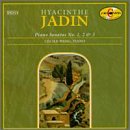| All Artists: Jadin, Wang Title: Piano Sonata No 1 & 2 Members Wishing: 0 Total Copies: 0 Label: Koch Discover Int'l Release Date: 8/19/1997 Genre: Classical Styles: Forms & Genres, Sonatas, Historical Periods, Classical (c.1770-1830) Number of Discs: 1 SwapaCD Credits: 1 UPCs: 071083201929, 741952419228 |
Search - Jadin, Wang :: Piano Sonata No 1 & 2
 | Jadin, Wang Piano Sonata No 1 & 2 Genre: Classical
|
Larger Image |
CD Details |
CD ReviewsA revelation. Hats Off, Ladies and Gentlemen, a Genius! 07/02/1999 (5 out of 5 stars) "Having purchased this CD on a whim, and by dint specifically of its composer's dates (which were smack in the middle of the High Classical era), on listening I was --- Amazed. Hyacinthe Jadin died of TB at the age of 24 (younger than Mozart, Schubert, Mendelssohn, Chopin or Bizet)(Also NOTE: the year of birth indicated on this disc is incorrect: Jadin was born in 1776, not 1769), and on the strength of these marvellous sonatas, had he lived and fulfilled even a portion of his promise, he would have been a major composer. The works are vivid, brilliant, and yet are at times deep or intellectual, and show a fertility of invention and maturity quite remarkable in a man of his age. Some of the movements remind one of Beethoven, some of Mozart, some of Hummel, some of Mehul; others are premonitions of Chopin, Schubert and Mendelssohn. And yet all cohere with a very strong and vibrant musical personality. This record is a treasure, and at bargain price too! And very well recorded, if a bit forward. Since it was released, a number of other recordings of Jadin's sonatas have come out, as well as some of his equally wonderful string quartets. He wrote also concerti and piano-chamber music (trios &/or quartets) and we can only hope some excellent groups will delve into this repertoire, which, if this record is a guide, promises to be revelatory. Update: I disagree that Ms Wang's playing is substandard. While she may not have the utter impeccability that some demand, neither did Schnabel, for example. One can forgive a minor flub here or there for such soulful and moving playing-- and I for one find it so. Also it is nice to have the works on a modern piano (I cordially dislike "period instrument" performances). Regarding the wonderful Hyacinthe Jadin, he wrote three (three!) piano concertos-- PLEASE, PLEASE someone, record them!!!Everything I have heard by this genius, taken at so early an age, has proven wonderful. And to those who buy this delightful disc, I think you will find it so also!" The Greatest Composer for the Fortepiano France produced in Dexter Tay | 02/16/2008 (4 out of 5 stars) "Why these great sonatas have not been recorded more on the modern grand I cannot understand. Wang has taken the honour of doing so by being the first. The greatest of them - among them the C minor and the F sharp minor, touch the inner recesses of the human psyche and attain a range of emotive expression in ways that even Beethoven's sonatas do not (both being near exact contemporaries of one another, just that the latter outlived the former by almost three decades). That in itself, should be sufficient cause to secure more listeners for Jadin's art - which intimates both the pathos of Beethoven and the elegance of Mozart.
The C minor is more dramatic, with its declamatory octaves that sound very close to the opening theme of Mozart's C minor sonata (with the difference being the interval of the fifth rather than a third). What follows is a motivic "question and answer" of a sublime reckoning that even Beethoven would admire. The expansive arpeggios of the second movement points in the direction of Chopin, while the gentle elegance is clearly Mozartian. Regret is no longer a sentiment held on to; peaceful resignation and heavenly contentment soothes the heart. A capricious third movement follows, and the marked contrast in moods displays Jadin's creative capacity and immaculate skill that could only come from a genius. The F-sharp minor sonata is altogether more tragic - with its understated opening theme that seems to encapsulate the entire suffering of the world. The running triplets of the secondary theme persuades the piece along, culminating in the recapitulation in the minor mode - of a brooding instropection that did not seem to have found its answer raised by the opening. What follows isn't a slow movement, but a minuet interspersed with a lovely waltz in the middle, concluding with a bold third movement that firmly places Jadin in the ranks of the early fortepiano revolutionists - Dussek and Beethoven. Cecile Wang has judiciously chosen to record Jadin's two greatest (in my regard) sonatas in the minor mode (and perhaps of the entire set of sonatas). I think the review that her playing is sloppy and that the recording is terrible is very much unfounded. For one, this is one of the better live recordings I've heard of any solo recital. Wang might have taken awhile to warm up for the performance; most performers do, even the greatest pianists around. Circumstances had it that this was not a studio recording, which of course, would have sounded perfect with all its splicing. Interpretively-wise, I think Wang's shaping of the melodic lines were full, rounded and beautiful. The tempi were generally fast, and the only major criticism I could think off is that some of these faster passages could have been more thoughtful and played slower. The piano sounds a little clanky, and Wang perhaps overpedalled in some areas (bearing in mind that Jadin's pieces are in the classical mould, suited to the fortepianos of their time). Very minor lapses, some unobtrusive slips, make for what you would generally find pardonable in any live performance, even of the greatest pianists. " |

 Track Listings (9) - Disc #1
Track Listings (9) - Disc #1